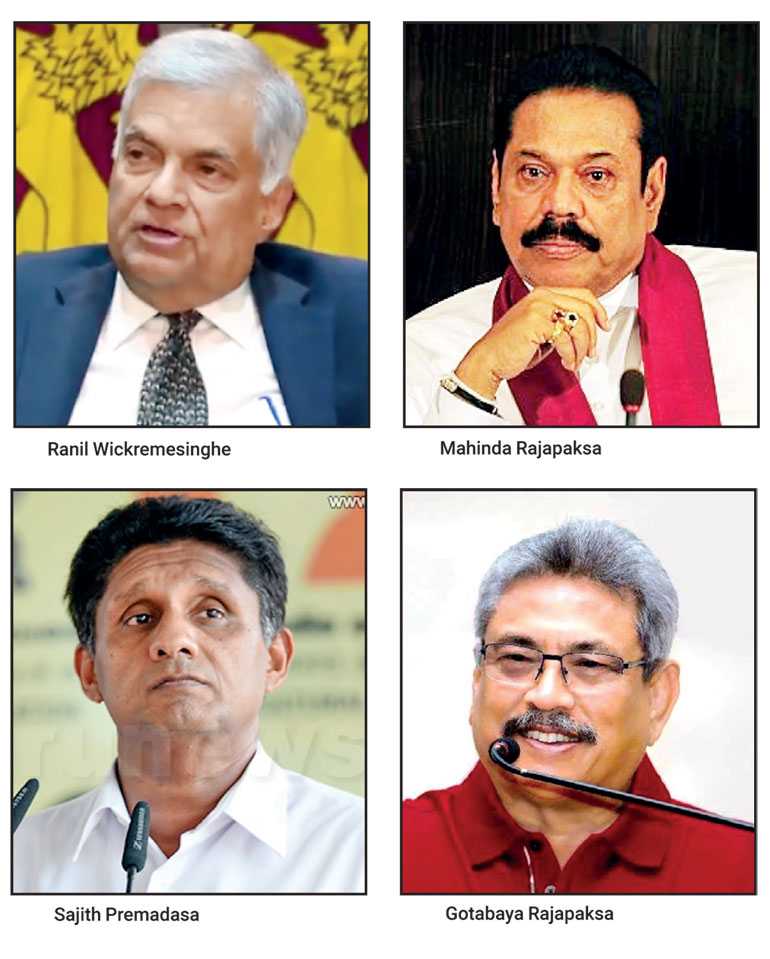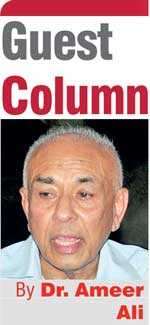Tuesday Feb 17, 2026
Tuesday Feb 17, 2026
Thursday, 7 November 2019 00:00 - - {{hitsCtrl.values.hits}}

Four personalities – GR, SP, MR and RW, two offices – Presidency and Prime Ministership and two elections – Presidential and General, can produce five different configurations of a President-Prime Minister duumvirate, based on the assumption that victory for the party or coalition of parties in the first election does not automatically guarantee victory in the second. Following are those possibilities.
President-Prime Minister duumvirates:
GR-MR
GR-RW
GR-SP
SP-RW
SP-MR
Supposing that the same party or coalition of parties wins both elections, then the first and fourth alternatives command very high probabilities of becoming reality. How will these two duumvirates function, what sort of economic challenges they will face and what programs do they have to meet those challenges deserve close scrutiny.
In all probability, a GR-MR duumvirate will be authoritarian if not dictatorial – somewhat similar to the one that existed before 1915, but can be expected to be tumultuous because of the different roles, positions and character of the two personalities. Blood is said to be thicker than water. However, history of world politics is replete with instances of patricides, matricides, fratricides and tyrannicides in desperate attempts to capture and maintain political power.
In our own country’s history, didn’t King Kassapa kill his father Datusena in 5th century to enthrone himself? In recent times, and outside Sri Lanka, there was fratricidal massacre in the Royal household in Nepal. Barring such bloody turn of events, GR-MR regime will be marred by personality clashes. This explains why MR was reported to have been very reluctant to nominate GR and preferred another of his siblings as the SLPP nominee for the presidential race. 
GR has a military background and is a disciplinarian, and says that he would form a cabinet of technocrats to produce clean governance, whereas MR is a populist, politically sagacious and a proud patriarch of an overly extended and ambitious family, in which almost every grown up wants to have a stake in the patriarch’s government. Didn’t MR build a Rajapaksa family forest during his regime?
Contrary to GR’s wish for a technocratic cabinet, the actual composition and size of that cabinet would depend on the calibre of members elected to the parliament on the one hand, and on the generosity of MR’s payback for services rendered by his henchmen. Unless GR brings his technocrats through back door, there is no chance that his ambition translates into reality.
Moreover, thanks to the outgoing President Sirisena, who after allowing the 19th Amendment to become law and then started crying that it was all a mistake, GR will find it extremely hard to reverse his constitutional position, in spite of his authoritarian personality.
Cabinet positions will be demanded by and offered to those who contributed most to the victory of SLPP. In that case, how far would President GR resist the creation and expansion of an omnibus cabinet dominated by mediocrity? Also, how would GR deliver his promise of clean governance given the corrupt buddies surrounding his populist brother Prime Minister?
There was one instance, reported to have been related by GR himself, that when he was the Defence Secretary, President MR dumped without any notice, hundreds of newly appointed employees into the defence department for whom there was no meaningful work. Obviously, GR could not object, because it was an executive president’s decision. Now, with their respective positions reversed, will a disciplinary President GR tolerate such outlandish appointments by populist PM, MR? In short, will the GR-MR duumvirate suffer from the same instability that bedevilled MS-RW coalition? A modern democracy can easily be turned into medieval tyranny, because of personality clashes at the top.
What would be the state of a SP-RW duumvirate? The first battle that a President SP has to confront would be in choosing a prime minister with whom he could work smoothly. RW insists that he would not give up his party presidency. If SP becomes the President, in spite of RW’s persistent unwillingness and last minute acceptance of SP’s nomination, will SP forget and forgive RW and accept him as PM? Or, will there be an internal upheaval inside the UNP to elect a new president to work with SP, and will that lead to a party split?
True, in politics, there are no permanent friends and enemies. Yet, in this case, there are, in addition, certain unspoken and socially stratified factors that can continue to bedevil RW-SP relationship. Democracy, in spite of its roominess to accommodate differences and fissiparous tendencies is the best form of government that humanity has invented.
However, as Sri Lanka so agonisingly witnessed the paralysis in governing due to the MS-RW split, a renewal of such bitterness between the Prime Minister and President would be far more injurious this time to the ailing economy and struggling masses. With SP as the president, the country may have to endure a virtually acephalous democracy for some time at least.
Foremost problem
Whichever the shape of the next duumvirate, the foremost problem confronting the country is its economy. If there is one common theme in SP’s campaign, it is his commitment to enhance people’s welfare. On this subject, his promises have been recklessly lavish to say the least, and he has not elaborated how he would fund those promises. Similarly, the most outstanding aspect of GR’s campaign is understandably his commitment to enhance internal security to prevent the rise of domestic terrorism.
For some time in the past, he had been raising, without any credible evidence, the bogey of a re-born LTTE threat, and since the bloody Easter Sunday, he is targeting Islamic terrorism. Being a man from the army he is obviously qualified to raise the security issue. However, one should understand that security cannot be achieved solely through military means. It is enormously expensive and can be counter-productive.
Instead, or, in addition, the underlying issues that create insecurity in the first place should be studied, analysed and understood, and appropriate measures should be taken to solve those issues. So far GR has been silent on this dual approach. Also, the resolve to safeguard the sovereignty of the country by both candidates can be treated as no more than empty rhetoric, given the complexity of Indian Ocean geo-politics and the way Sri Lanka has been drawn into its vortex.
But, how the two rivalling leaders are going to promote steady economic growth without impoverishing the people is not at all clear in their respective campaigns. SP, as noted earlier, has been quite outlandish in his welfare promises. Is he going to rob Peter to pay Paul? Or, is he bestowed with a magic wand to create economic opulence from nowhere? How will he finance his welfare measures? GR on the other hand, has been proposing uncoordinated reforms like tax reduction, simplification of taxes and incentives for local producers. His manifesto is also full of generalities without specifics. Ad hoc measures and uncoordinated reforms are not going to uplift the economy.
Without at least balancing the budgets and achieving trade surplus at the same time, the country cannot service, let alone settle, its escalating foreign debt and accumulate enough funds to develop the country. Balance budgets require fiscal discipline by reducing wasteful expenditures and increasing revenue. However, there are certain expenditures such as investing in infrastructure development, and spending on welfare measures like health, education, income subsidies to the poor and environmental improvement that cannot be compromised.
On the other side of the balance sheet, revenue has to be raised. This requires a progressive tax structure with an efficient tax collecting machinery. Indirect taxes like VAT that are currently implemented in the name of broadening the tax base, are essentially regressive and their incidence falls disproportionately heavy on low income groups. Yet, that is what is advocated by neo-liberal economic pundits, advisers and managers. Sri Lanka’s tax structure needs systemic change.
At least in food production and fisheries the country must achieve self-sufficiency. Employment generating and technologically oriented industries should be promoted and their output must become competitive, at least in regional markets. In this regard, our ambassadors abroad must be encouraged to become, in addition to their diplomatic duties, marketing agents to our exports. Unemployment must be solved not by increasing file-pushing jobs in government departments, but by making education skill oriented. This needs a thorough overhaul of the country’s educational structure, from schools to universities.
There is also a need for a renewed emphasis on English language. By neglecting English education successive governments have locked our talented men and women from competing for jobs in the world market. All this and more need a well thought out and comprehensive economic plan with attainable objectives. Unfortunately, the idea of economic plan and planning, has fallen into disrepute among free market thinkers.
People-centric economies
Free market needs a human face. This is the missing component in modern theories of economic growth and economic models. These models have made economies more market-centric than people-centric, and they expect a prospering market to trickle down its riches to the masses at the bottom. As Galbraith once remarked about this doctrine in his usual and unique satire, “If you feed the horse with oats something will drop from its hind for sparrows to pick”. This was his apt judgement on the trickle down approach.
The widening wealth and income gaps that are unmistakeably noticeable in neoliberal economies is open testimony to the glaring injustices of market-centric economic experiments. This was why even China when it adopted the market model, caged it within a five-year plan and added a Chinese face to it. Some economists described it a bird-cage economy.
Given the current state of play, Sri Lanka’s economy needs more than fiscal discipline and strong macroeconomic fundamentals. The new rulers need to rethink about the open market structure. This is not to argue that they should sacrifice the market in favour of ‘dirigisme’, but to redesign the market to make it more people-friendly and more welfare-focused. That demands systemic changes. It also calls for the re-energisation of people-centred production activities.
People are a country’s most valuable asset. Without their energetic participation no economy can grow. Yet, how and why should they participate when sections of them feel that they are discriminatively treated in the distribution of benefits resulting from their participation? This is why, as prerequisite for this re-energisation, the vexing ethnic issue must be settled without any more delay and with a genuine commitment to peace and tranquillity in the country.
It demands a bold leadership from all communities. Having arrived at a settlement, elements that continue to rekindle the ethnic fire should be brought under control. In essence, what the nation is facing now is a multifaceted challenge that needs a multi-prong response. Neither a GR-MR nor a SP-RW duumvirate seems to promise this.
(The writer is attached to the School of Business and Governance, Murdoch University, Western Australia.)